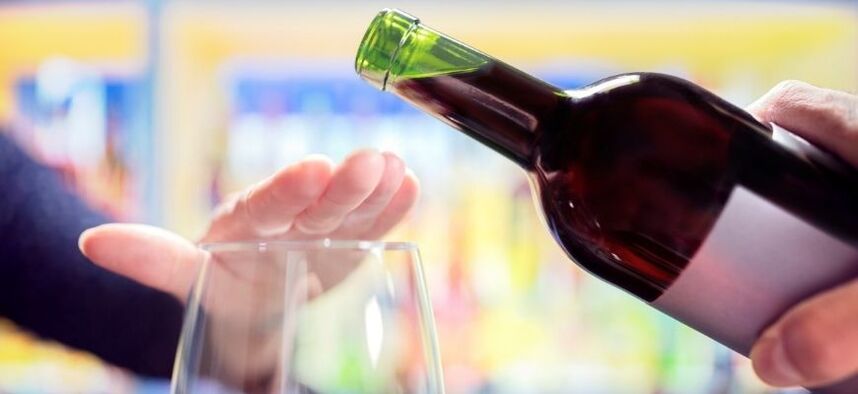Treatment of any form of alcoholism involves the patient's complete abstinence from alcohol. If the patient does not want a person to live in a sober state, the success of the therapy is reduced to zero. On the contrary, a person's understanding of his illness is already the first step to achieving remission. Becoming so conscious is the result of a person's very complex work on himself and requires a lot of time and effort. Therefore, it is best for a person to consult a doctor to stop drinking.

Reasons to stop drinking alcohol
There are many reasons why a person may stop drinking. Among the most important:
- desire to be healthy;
- deterioration of health and development of chronic diseases;
- more attractive appearance in people who do not have problems with alcohol;
- a sober, sharp and flawless mind, a desire to adequately understand the surrounding reality;
- high efficiency;
- good attitude and impeccable reputation at work;
- saving money (financial expenses for alcohol always take a significant share in the alcohol budget);
- high sexuality, no problems with potency in men or menstruation in women;
- the availability of strength and time (after all, the life of a person in the alcohol network is governed by one desire - to drink);
- great mood, cheerfulness;
- healthy atmosphere at home;
- full, bright and healthy life;
- healthy generation.
The road to sobriety is long and difficult. But a person has a chance to get rid of addiction by following the recommendations of doctors. For this, the most important thing is to have a strong desire to recover and an iron will.

Can a person stop drinking on their own?
Doctors warn: there are no former alcoholics. Alcoholism is an incurable disease. However, the patient always has a chance to achieve a stable remission and stop drinking alcohol. The duration of the sobriety period is variable and can vary from several months to several decades.
Methods of mental influence on the patient to stop alcohol intake are effective. They allow the patient to have a negative attitude to alcohol and thereby prevent relapse. With a positive result, a strong belief is formed that one can live a healthy and fulfilling life without drinking a drop of alcohol.
Successful treatment of alcoholism depends on many factors. The most important thing is that a person decides whether or not to drink alcohol.
Spontaneous remission
It rarely happens that a person stops drinking on their own. A certain factor prompts this: a person accepts his illness and then decides that something needs to be changed in his life.
The main disadvantage of spontaneous remission is uncertain persistence and spontaneity.
Motivation Remission
At this time, a person consciously refuses to drink alcohol. More often this happens when there is a threat to a person's life. A person who consciously gives up alcohol raises a number of financial problems, and also solves the problem of protecting the family.
Gradually, a person comes to the conclusion that completely giving up alcohol will allow him to achieve his goals in life and consolidate his success. In remission, he is fully convinced that his choice is correct and that despite the trials, it is a priority. Moreover, every victory over alcohol and the approval of the people around him strengthens the sobriety position.
Forced remission
A person does not always aspire to a sober lifestyle voluntarily. Many people who are addicted to alcohol do not always understand how harmful their bad habits are. However, circumstances take their toll. For example, if the director is at work or a spouse, the child puts a person in front of a choice, which must be obeyed. Otherwise, it will be displayed throughout the life of the alcoholic.
Forced remission is usually not permanent. Moreover, a person is constantly in a state of tension, because he experiences distress and anxiety from this kind of compulsion. A breakdown after such a remission usually leads to very serious consequences.
Somatogenic remission
If a person learns about a sharp deterioration in his health, he usually stops drinking alcohol. The most common situation, against the background of delirium tremens, a patient needs to give up alcohol.
Also, alcoholics fear the consequences of a serious illness (for example, a heart attack or stroke). Against the background of negative emotions, they completely lose their attraction to alcohol. Realizing the harm of alcohol, albeit belatedly, forms a new attitude: survival is a higher priority than drinking alcohol and short-term intoxication.
Psychogenic remission
This variant of alcohol withdrawal is associated with somatogenic remission. When a person realizes what he did while drunk, he gets a big shock. Embarrassed by his actions, he decides to stop drinking.
There can be many such reasons. It often happens like this:
- traffic accidents as a result of drunkenness;
- taking the lives of one's own children;
- violence.
Such a remission is unstable and short-term. Sometimes a strong trigger works in the opposite direction and the person begins to drink more. In case of alcoholic forgetfulness, suicide is not excluded.
Postintoxication remission
The nature of this remission cannot be fully determined. It is characteristic of people who chronically abuse alcohol. One day they stop drinking and do not argue with this decision.
Doctors suggest that at a certain point, poisoning with ethyl alcohol and its decomposition products reaches a critical level. At this moment, biochemical processes in the brain change, an aversion to alcoholic beverages arises. It is interesting that the taste and smell of alcohol suddenly becomes unpleasant. Even small doses cause nausea and vomiting.
Postintoxication remission is relatively stable. However, relapses are not excluded when a person's health condition improves significantly against the background of a sober lifestyle.

Advice for those who want to stop drinking
Any person who has abused alcohol in the past cannot easily cope with a sober state. Some have a painful desire for alcohol, a desire to immediately throw "a glass or two". For those who are firmly and confidently embarking on a sober path, this kind of advice can help.
- You need to go to a special clinic. Here, specialists will choose an individual treatment plan and, if necessary, prescribe effective drugs. Psychologists and rehab specialists will help you recover from the binge, cleanse your body, and develop a lasting negative attitude toward the use of ethanol.
- If you want to stop drinking, that's half the battle. The patient must recognize the presence of the disease. If possible, the problem with alcohol should be discussed with your loved ones.
- The patient should stop all contact with people who drink alcohol and are tolerant of addiction.
- Throw away all alcoholic beverages in the house. This will make it much easier to avoid temptation. If there is a calm reaction to people who drink alcohol, then this is already a success.
- You should be prepared for the development of withdrawal symptoms during alcohol withdrawal. At the same time, various psychophysiological disorders will suffer. The urge to pick them up can be overwhelming. At this time, it is important not to give in to weakness. It is very difficult to deal with withdrawal symptoms on your own, so you should rely on professionals.
- You should read literature about various aspects of alcoholism. It is important to avoid sources of questionable origin. Any question can be discussed with the doctor.
- The daily routine should include different types of physical activity. It is important to eat well and fully, as well as rest. Learning how to avoid or at least not react to stress is ideal.
- Some can be helped by moving, interacting with other people.
- An interesting hobby will improve the emotional background. Some people find career changes, volunteering, and outdoor activities helpful.
- At gatherings and holidays, it is necessary to look for an alternative to alcoholic beverages, which, unfortunately, have become traditional. Even one cocktail can spoil all previous efforts.
There is no one-size-fits-all way to quit drinking. Every alcoholic should look for the most suitable option. It is important to contact specialists to prevent relapses and achieve a positive effect.































